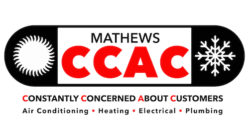
During the cold months the unit extracts latent heat energy from outdoor air, concentrates it with a compressor and disperses it through ductwork to warm the house. In summer, the system reverses and takes heat energy out of the house and disperses it into the air outside, leaving cool indoor comfort behind.
Two ratings express efficiency of heat pumps:
- SEER. Short for Seasonal Energy Efficiency Ratio, this rating expresses cooling efficiency. The formula calculates the amount of BTUs of heat removed from the house in a specific time frame versus the amount of electricity consumed in kilowatt hours. The higher the SEER rating, the more efficiently the unit operates in cooling mode. Greater efficiency usually means lower monthly operating costs and more dependable cooling. The Federal minimum SEER rating for heat pumps is currently 14, however, high efficiency units are available with SEER ratings over 20.
- HSPF. It stands for Heating System Performance Factor and represents the energy consumption of a heat pump operating in heating mode. HSPF ratings are derived by figuring the total BTUs of heat energy supplied by a heat pump during an average winter heating season, divided by the amount of electrical power consumed by the unit over the same span of time. Currently, the nationwide Federal minimum HSPF is 8.0. The most efficient heat pumps offer HSPF as high as 10.2.
Heat pumps display both the SEER rating for cooling and the HSPF heating rating on the same yellow EnergyGuide label affixed to all units. Both figures are shown as a raw numeral as well as a graphical illustration depicting how the energy efficiency of the unit compares to others in the general available range.
For more information about evaluating heat pump efficiency, in the Coastal Bend contact the professionals at CCAC.
Our goal is to help educate our customers in Corpus Christi, Texas about energy and home comfort issues (specific to HVAC systems). For more information about HVAC topics, download our free Home Comfort Guide or call us at 361-678-2495.
Credit/Copyright Attribution: “PublicDomainPictures/Pixabay”












